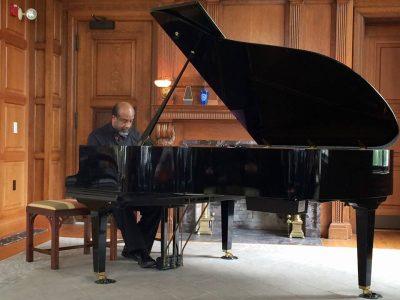
A year after the initial onset of the pandemic, Boston University’s College of Fine Arts professors are finding new ways to perform despite ever-changing restrictions and conditions.
From meeting in person to creating digital recordings, CFA faculty continue to motivate their students during unprecedented times.
Terry Everson is an associate professor of music who has played trumpet with the Boston Pops Esplanade Orchestra and tours with the Rodney Marsalis Philadelphia Big Brass.
Everson said while he has been sustained by his full-time position at BU, this past year has been difficult for musicians whose income is solely performance-based. He last performed with the Boston Pops on New Year’s Eve in 2019 and with the Rodney Marsalis group in February 2020.
“My wife and I just figured out our taxes for last year, and between the two of us, we found a difference in $30,000 in our income for this year,” Everson said. “But we’re doing a lot better than a lot of our colleagues around town who are only making money by performing.”
Using editing software such as Adobe Premiere Pro, Everson put together a video of the BU Trumpet Ensemble performing last spring and posted it on YouTube, where it received more than 2,500 views.
“I can’t say that any of us in the performance area is probably completely satisfied with what we’re doing compared to what we’d really like to do with our students,” he said. “However, we are trying to find our best ways of really helping our students navigate the future.”
Brass and woodwind musicians in student ensembles were not allowed to perform in person following a decision made by BU at the beginning of the semester, which was later reversed.
Everson said the one positive aspect of the online experience is that his students learned early on how to create a digital portfolio for future job applications, something Everson said he finds valuable and has emphasized more to his classes.
Associate Professor of Viola Steven Ansell, who has been a professional musician for 46 years, is the principal violist of the Boston Symphony Orchestra and co-founded the Muir String Quartet in 1979.
Ansell said his quartet has not performed a concert in more than a year, and the BSO has been releasing live recordings for online listeners.
“We’ve been recording performances, but there’s no people in the audience at all,” he said. “We’ve all been socially distanced when we’ve been playing and wearing masks and so forth. We sort of got used to it, but it’s not the greatest circumstance, shall we say.”
Because students are living in different in time zones, quartet members use an app called Soundtrap to record tracks separately and compile them later.
“They each record a track and then they put it together,” he said. “It’s a very poor substitute for even getting together as a group, just the four of them in the same room, and rehearsing and playing for me from that room. But that’s all we can do.”
Rob Patterson, an assistant professor of clarinet, said he had recordings and premieres scheduled in Hong Kong last year that were canceled due to the pandemic.
“Little by little, I think all the musicians saw just one after another after another,” Patterson said, “then all of a sudden, we were all left with totally blank calendars for performances.”
In June 2020, Patterson launched a 10-week online program for clarinet players called The Clarinet Sessions. He brought in professional musicians from the New York Philharmonic, Los Angeles Philharmonic, Berlin Philharmonic and other performance groups to give lessons on the instrument.
“That’s been a really big part of what I’ve been doing during the pandemic,” he said, “trying to create a sense of community, inspiration and give people something to hold on to during these difficult times.”
However, Patterson said virtual performances and lectures have allowed people from all over the world to connect with each other via Zoom.
“It’s been remarkably okay, and even a plus,” Patterson said. “This last weekend, we were able to have a guest artist from Helsinki, Finland Zoom in and give a master class for all the students. So, there are some advantages, shrinking the globe is certainly one of them.”

























































































































